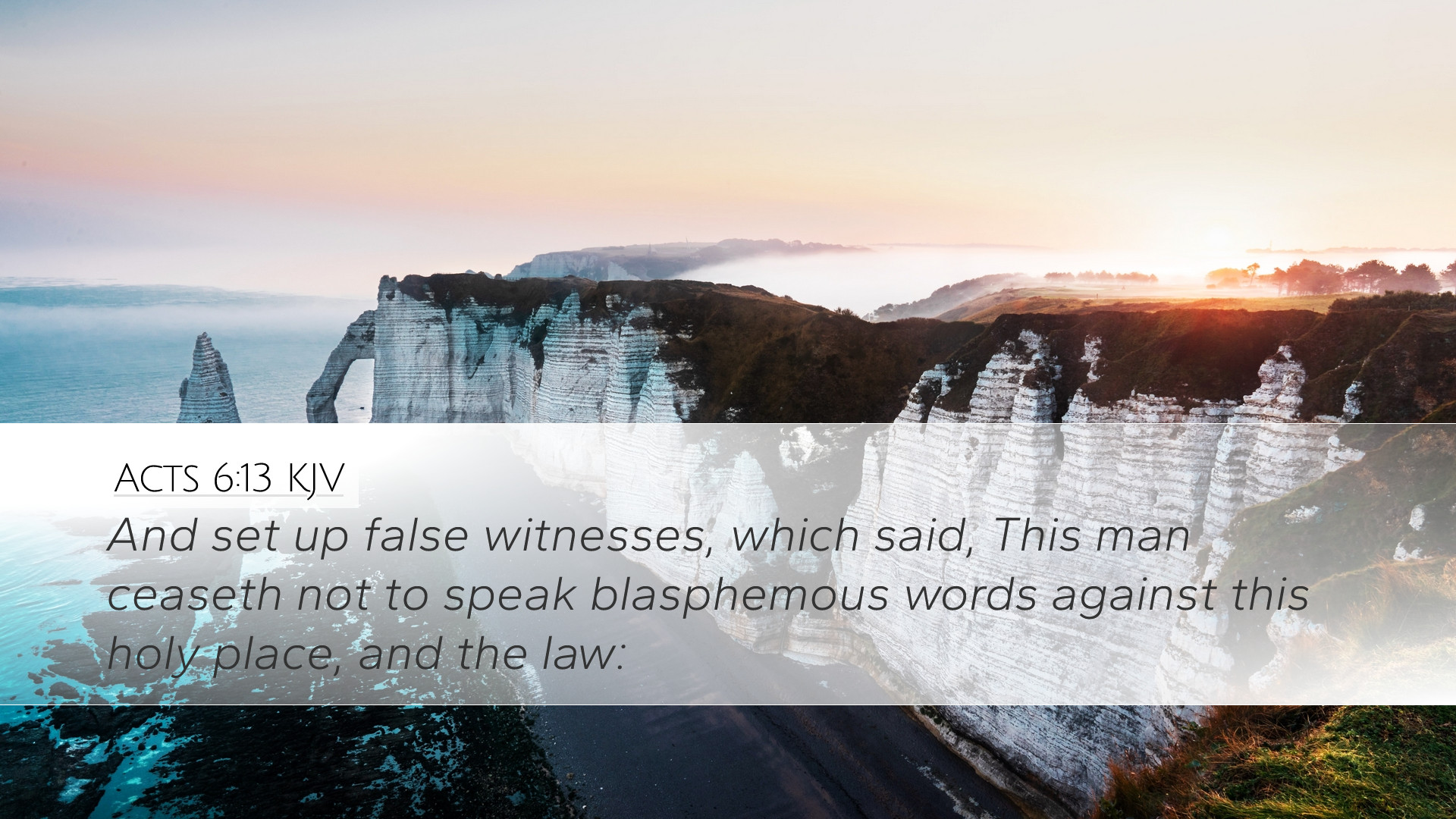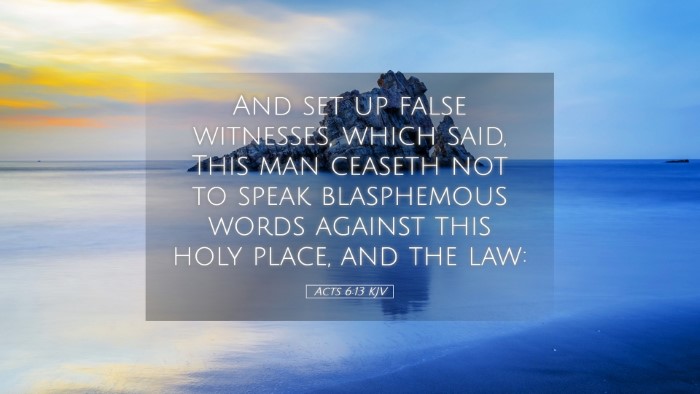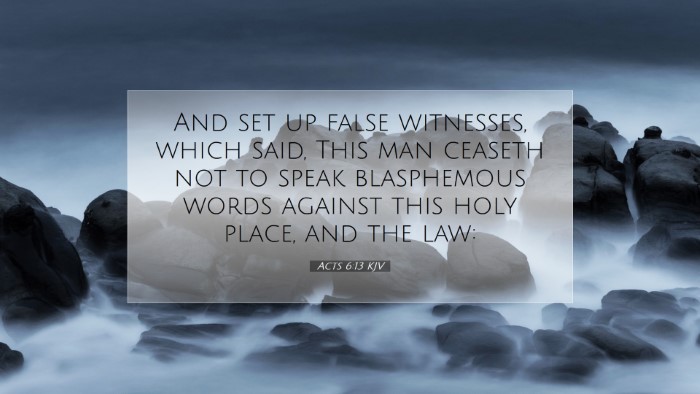Old Testament
Genesis Exodus Leviticus Numbers Deuteronomy Joshua Judges Ruth 1 Samuel 2 Samuel 1 Kings 2 Kings 1 Chronicles 2 Chronicles Ezra Nehemiah Esther Job Psalms Proverbs Ecclesiastes Song of Solomon Isaiah Jeremiah Lamentations Ezekiel Daniel Hosea Joel Amos Obadiah Jonah Micah Nahum Habakkuk Zephaniah Haggai Zechariah MalachiActs 6:13
Acts 6:13 KJV
And set up false witnesses, which said, This man ceaseth not to speak blasphemous words against this holy place, and the law:
Acts 6:13 Bible Commentary
Commentary on Acts 6:13
Verse Reference: Acts 6:13 - "And set up false witnesses, which said, This man ceaseth not to speak blasphemous words against this holy place, and the law."
Introduction: This verse occurs in the context of the trial of Stephen, one of the first deacons of the church. The passage illustrates the tension between the early Christian movement and the established Jewish religious authorities. The accusations levied against Stephen provide significant insights into the early church's challenges and the nature of false testimony.
Contextual Insights
In this chapter, we see the rapid growth of the church following Christ's ascension. Stephen, full of faith and the Holy Spirit, performed great wonders, which provoked jealousy among certain factions of the Jewish leadership. The accusation set forth by false witnesses highlights the persistent conflict between the early followers of Jesus and the Jewish authorities, a prevalent theme in the book of Acts.
Commentary from Matthew Henry
According to Matthew Henry, the false witnesses against Stephen exemplify the malice of those who oppose the truth. Henry emphasizes that the accusers fabricated their testimony to undermine the church's influence and discredit its leaders. He notes that such behavior was not uncommon; the enemies of the truth often resort to deceit and manipulation when they cannot counter the message with reason.
- The Nature of False Accusation: Henry remarks that false accusations arise from envy and a desire to protect one’s standing and authority. When the truth threatens established norms, those in power may resort to slander as their weapon.
- Transformation of Accusers: He also points out the profound irony that those who execute such deceitful actions often believe they are serving God, thus blind to their spiritual state and the ramifications of their actions.
Commentary from Albert Barnes
Albert Barnes provides a detailed exploration of the implications of this verse. He asserts that the designation of “false witnesses” is telling, and it highlights the ethical breaches present among the Jewish leaders. Barnes identifies several important themes from this verse:
- Blasphemy as a Charge: The accusation of blasphemy against Stephen is significant as it reflects the seriousness with which the Jewish leaders treated perceived infractions against their teachings and traditions.
- Holy Place and the Law: Barnes underscores that the reference to “this holy place” signifies the temple, central to Jewish worship, while the law represents the Jewish legal and moral code. The charges against Stephen were not merely theological but aimed at dismantling his credibility as a leader.
- The Role of Witnesses: He notes that witnesses in Jewish law were pivotal for establishing guilt, which makes the act of providing false testimony particularly grievous. This sets an ominous precedent for future persecutions faced by the early church.
Commentary from Adam Clarke
Adam Clarke's analysis focuses on the broader implications of such testimony. He stresses that the early Christian community was often subjected to persecution not merely for their beliefs but for the way their beliefs transformed societal norms and expectations.
- Response to Opposition: Clarke illustrates that Stephen’s commitment to his faith, even in the face of false allegations, serves as a powerful model for believers facing trials. The strength of his conviction stands out against the backdrop of deception.
- Connection to Prophecy: He references how such events were foretold in biblical prophecy regarding the treatment of the righteous by the wicked. Clarke believes that these moments serve as validation of God's sovereignty amidst human malfeasance.
Theological Insights
This verse is rich with theological significance. The act of accusing Stephen poses essential questions about truth, integrity, and faithfulness amid adversity. The proclamation of Jesus as the Messiah challenged entrenched beliefs and traditions, leading to a zealous but misguided response from authority figures.
- The Cost of Discipleship: For modern readers, this passage serves as a reminder that following Christ may lead to misunderstanding and opposition. The witness of believers must be rooted in truth and character, as Stephen modeled.
- False Witnesses Then and Now: The notion of 'false witnesses' raises contemporary issues regarding integrity in spiritual leadership. The calling to uphold the truth, especially in difficult circumstances, remains a critical aspect of Christian testimony.
Conclusion
Acts 6:13 draws attention to the impact of false testimony within the early church and serves as a cautionary tale for all who aspire to follow Christ. Engaging with this verse and the surrounding context challenges pastors, students, theologians, and scholars to reflect on the nature of their witness, the authenticity of their faith, and the power of truth in a world often clouded by deceit.
As today's believers navigate an environment that often mirrors the adversities faced by early Christians, their resolve to speak boldly of faith in Jesus will continue to be tested. Understanding the historical and theological implications of Acts 6:13 is crucial for effective ministry, personal integrity, and fostering a biblical worldview amidst competing narratives.


